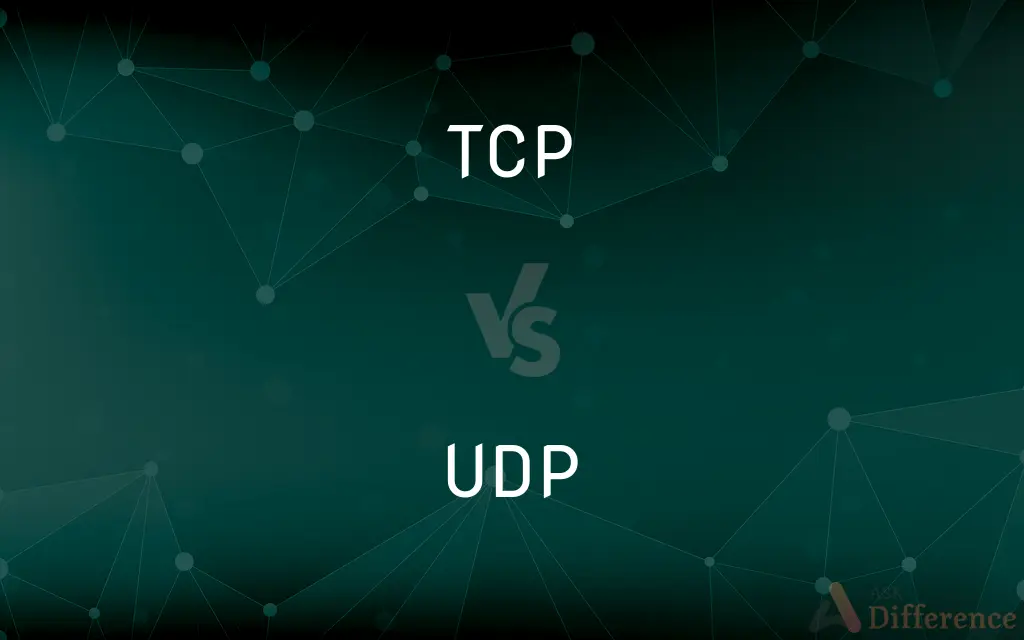TCP vs. UDP — What's the Difference?
By Tayyaba Rehman — Published on December 8, 2023
TCP and UDP are internet protocols; TCP ensures data delivery with error-checking, while UDP offers faster transmission without such guarantees.

Difference Between TCP and UDP
Table of Contents
ADVERTISEMENT
Key Differences
TCP (Transmission Control Protocol) and UDP (User Datagram Protocol) are both core protocols of the Internet Protocol Suite. They serve as methods to send data across networks, with each offering unique advantages and disadvantages.
TCP is known for its reliability in data transmission. When data is sent via TCP, it guarantees that all packets will reach their destination, and in the order they were sent. If a packet goes missing or gets corrupted during transit, TCP will identify the issue and ensure the packet is resent. This makes TCP ideal for applications where data integrity is paramount.
UDP, on the other hand, prioritizes speed over reliability. It sends data packets without establishing a formal connection and doesn't guarantee the delivery or order of packets. If a packet is lost in transmission, UDP does not resend it. This might sound like a drawback, but it's actually beneficial for real-time applications like streaming or gaming, where speed is more critical than perfect data integrity.
A metaphorical way to understand the difference is to imagine TCP as a delivery service that ensures a package reaches its recipient and verifies its contents, while UDP is like mailing a postcard, quick and without any guarantees.
In choosing between TCP and UDP, it's not about which is better universally, but which is more suitable for a specific application. Websites and file transfers often use TCP for its reliability, while voice over IP (VoIP) and live broadcasts might prefer UDP for its speed.
ADVERTISEMENT
Comparison Chart
Reliability
Guaranteed delivery & order
No guarantees on delivery or order
Connection
Connection-oriented
Connectionless
Usage
Websites, file transfers
Streaming, gaming, VoIP
Error-checking
Comprehensive error-checking
Minimal error-checking
Speed
Slightly slower due to error-checking
Faster due to lack of error-checking
Compare with Definitions
TCP
A connection-oriented protocol ensuring data integrity.
Online banking sites use TCP to ensure transaction data is accurate and secure.
UDP
Does not guarantee packet delivery or order.
Live broadcasts might use UDP, valuing real-time speed over perfect data integrity.
TCP
Ensures data packets are delivered and in the correct order.
When downloading a file, TCP ensures all parts arrive and are reassembled correctly.
UDP
Offers minimal error-checking, prioritizing speed.
Voice over IP calls use UDP to deliver real-time voice data.
TCP
Part of the core Internet Protocol Suite.
Web browsers typically utilize TCP to fetch website data.
UDP
A connectionless protocol that offers fast data transmission.
Online gamers prefer UDP for its low-latency communication.
TCP
Often used where data reliability is paramount.
Email services use TCP to ensure all messages are delivered without errors.
UDP
Part of the core Internet Protocol Suite.
Video conferencing tools might leverage UDP for smoother video streams.
TCP
Provides comprehensive error-checking and correction.
If a packet is lost during transmission, TCP will resend it.
UDP
Ideal for applications where speed is more crucial than accuracy.
Some music streaming services utilize UDP to quickly deliver songs without noticeable interruptions.
TCP
A protocol developed for the internet to get data from one network device to another;
TCP uses a retransmission strategy to insure that data will not be lost in transmission
Common Curiosities
Are data packets larger in TCP or UDP?
TCP headers are typically larger than UDP headers because they carry more information for error-checking and sequencing.
Which is faster, TCP or UDP?
UDP is generally faster because it lacks the error-checking processes that TCP employs.
Is one more secure than the other, TCP or UDP?
Neither protocol inherently offers superior security; security depends on the higher-level protocols and applications in use.
Are TCP and UDP the only transport protocols?
No, but they are the most commonly used. Others exist, like SCTP.
Why might streaming services prefer UDP over TCP?
UDP's speed and reduced latency make it suitable for real-time data, like streaming.
Can an application use both TCP and UDP?
Yes, some applications may use both protocols for different purposes.
Can UDP handle two-way communication?
Yes, but it does so without establishing a formal connection like TCP.
In what scenario might UDP be a bad choice?
For applications requiring guaranteed data delivery and order, like file transfers, UDP might not be suitable.
Is TCP always the best choice for web browsing?
Generally, yes, because web browsing requires the accurate delivery of web pages.
Can lost UDP packets be recovered?
By default, UDP does not recover lost packets, but higher-level protocols or applications might implement their recovery methods.
Which protocol uses handshaking, TCP or UDP?
TCP uses a handshake process to establish connections.
Are TCP connections always maintained?
No, TCP connections can be closed after data transmission, and they may time out due to inactivity.
If UDP is faster, why not use it for everything?
While UDP is faster, it lacks the reliability and error-checking features of TCP.
Why might online games prefer UDP?
Online games value real-time response, making the speed and low latency of UDP attractive.
How can I tell if an application uses TCP or UDP?
Network monitoring tools can show which protocols applications are using.
Share Your Discovery

Previous Comparison
End-stopped Line vs. Enjambment
Next Comparison
Su vs. SudoAuthor Spotlight
Written by
Tayyaba RehmanTayyaba Rehman is a distinguished writer, currently serving as a primary contributor to askdifference.com. As a researcher in semantics and etymology, Tayyaba's passion for the complexity of languages and their distinctions has found a perfect home on the platform. Tayyaba delves into the intricacies of language, distinguishing between commonly confused words and phrases, thereby providing clarity for readers worldwide.














































